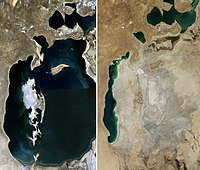
Photo from wikipedia
Context Grasslands provide a variety of ecosystem services (ESs) for humans. While much ES research has focused on forests and wetlands, synthesizing the currently somewhat sporadic studies of grassland ecosystem… Click to show full abstract
Context Grasslands provide a variety of ecosystem services (ESs) for humans. While much ES research has focused on forests and wetlands, synthesizing the currently somewhat sporadic studies of grassland ecosystem services (GESs) is much needed. Objectives We aimed to review the scope, major methods, and key findings of GESs, and identify knowledge gaps and future directions. Methods We conducted a systematic review of articles published during 1970–2018 (including 380 peer-reviewed articles from Web of Science and 32 book chapters from Google Scholar). Results The number of GES studies has accelerated in recent decades, with China (31%) and the United States (18%) together accounting for almost half of them. A total of 33 GESs were mentioned in the searched articles, of which carbon sequestration, forage production, and water erosion control had the highest frequencies. Methods for evaluating GESs include field survey, field experiments, and statistical and process-based modeling. Grasslands are the primary source of meat and dairy products, account for about one-third of the total carbon of all terrestrial ecosystems, and provide numerous other ESs, such as night cooling, soil erosion control, and flood mitigation. Conclusions This review presents the state-of-the-science of GESs, and identifies several future research directions. To move forward, we propose a framework with a 3-M methodology: (1) “Multi-scales”—understanding GESs from various spatiotemporal scales; (2) “Multi-methods”—evaluating GESs with multiple statistical and modeling techniques using multiple data sources; and (3) “Multi-perspectives”—assessing GESs from ecological, social, and economic perspectives for sustainability.
Journal Title: Landscape Ecology
Year Published: 2020
Link to full text (if available)
Share on Social Media: Sign Up to like & get
recommendations!